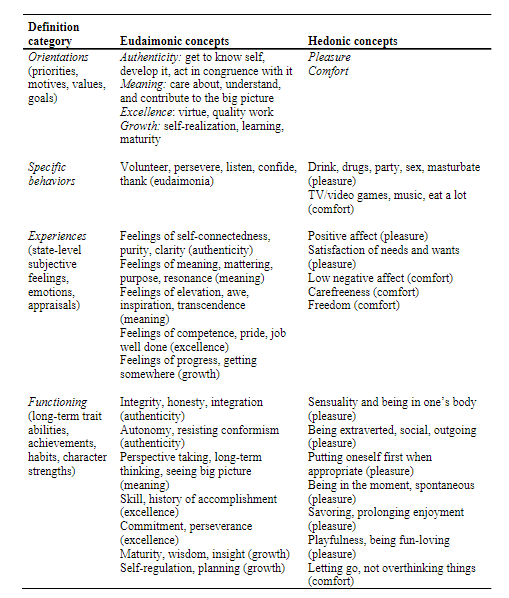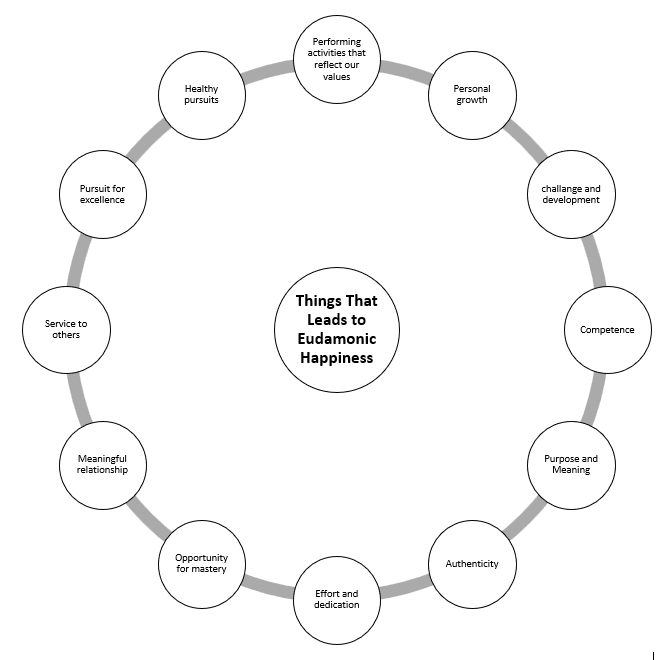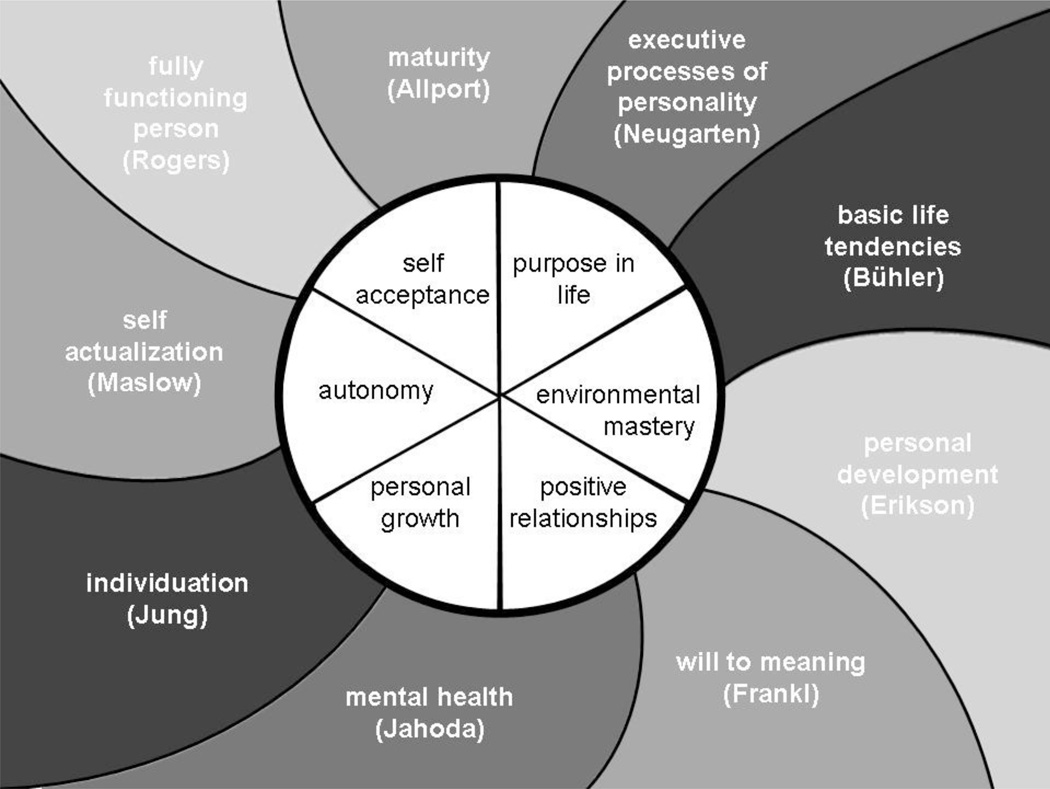Self-realization the process of striving toward full potential as fundamental yet obtainable only after the basic needs of physical survival, safety, love and belongingness, and esteem are fulfilled. Also called self-actualization.
Conception of SWB, like positive psychology as a whole, as works in progress. Though widely confirmed in research, some psychologists expanded three component view of SWB to include personal qualities and life activities believed to be the psychological underpinning of happiness.
Read More- What is Happiness?
These expanded conceptions express the eudaimonic view by defining happiness in terms of striving for self-realization.
Self-realization- The Eudaimonic Basis of Happiness
- Eudaimonic well-being is the type of happiness or contentment. We can achieve it through self-actualization and having meaningful purpose in one’s life.
Aristotle in The Nicomachean Ethics , define happiness as self-realization. Meaning the expression and fulfillment of inner potentials that include our talents, personalities, values.
- From this perspective, the good life results from living in accordance with your daimon (in other words, your true self).
- That is, happiness results from striving toward self-actualization—a process in which our talents, needs, and deeply held values direct the way we conduct our lives.
- “Eudaimonia” (or happiness) results from realization of our potentials. We are happiest when we follow and achieve our goals and develop our unique potentials.
- Eudaimonic happiness has much in common with humanistic psychology’s emphases on the concepts of self-actualization (Maslow, 1968) and the fully functioning person (Rogers, 1961) as criteria for healthy development and optimal functioning.
- Following the Hedonic view, measures of SWB ask people if they are happy and satisfied with their lives. Whereas, Eudaimonic measures of happiness also ask why people are happy.

Hedonic vs Eudaimonic Happiness (Huta, 2018)
What Leads to Eudaimonic Happiness?
- Waterman (1993) argued that eudaimonic happiness results from experiences of personal expressiveness.
- Such experiences occur when we engage ourself in life activities that fit and express our deeply held values and our sense of who we are.
- Under these circumstances we experience a feeling of fulfillment, of meaningfulness, of being intensely alive. A feeling that this is who we really are and who we were meant to be.
- Waterman believes that there are many more activities that produce hedonic enjoyment than activities. That enjoyment provide eudaimonic happiness accordingly on personal expression.
- Everything from alcohol consumption and eating chocolate, to a warm bath can bring us pleasure. But there are fewer activities that engage significant aspects of our identity and give a deeper meaning to our lives.
- Feelings of personal expressiveness (eudaimonic happiness) were more strongly related to activities. That activites created feelings of challenge, competence, and effort, and that offered the opportunity for personal growth and skill development.
- However, “The good life,” from a eudaimonic perspective, suggests that the pursuit of pleasure may detract from a personally expressive and meaningful life.
- Eudaimonic conceptions of happiness include consideration of the difference between healthy and unhealthy happiness.

10 Things That Leads to Eudaimonic Happiness
Psychological Well-Being and Positive Functioning
- Carol Ryff (1989) argued that the three-component model of SWB- life satisfaction (LS), positive affect (PA), and negative affect (NA)- fails to describe the features of a person’s life that provide the basis and meaning of well-being.
- Well-being, in Ryff’s view, is more than happiness with life. Well-being should be a source of resilience in the face of adversity and should reflect positive functioning, personal strengths, and mental health.

Ryff’s Dimensions of Psychological Wellness (Ryff, 2014)
- Consider the following question: Are happy people also mentally healthy people? At first glance the answer would seem to be yes. It is hard to imagine people suffering from depression or anxiety disorders also being happy.
Read More- What is Psychological Well-being?
- However, people with delusional belief systems or people who derive pleasure from hurting others might be happy and, at the same time, mentally ill; and in the latter case, considered so partly because of the pleasure they receive from hurting others.
- Eudaimonic conceptions of happiness include consideration of the difference between healthy and unhealthy happiness.
How to Develop Psychological Well-being?
Developing psychological well-being involves cultivating positive habits, practices, and mindsets that promote emotional, mental, and social health. Here are some simple, evidence-based techniques to improve psychological well-being-
1. Practice Gratitude- Regularly reflect on or write down things you are grateful for. You can do this by keeping a gratitude journal and writing three things you’re grateful for each day, whether it’s a kind gesture from a friend, a beautiful sunset, or a personal achievement. Studies show that practicing gratitude enhances well-being, increases life satisfaction, and lowers symptoms of depression. A study by Emmons and McCullough (2003) found that individuals who practiced gratitude experienced more positive emotions and greater optimism.
Read More- Gratitude Journal
2. Engage in Mindfulness Meditation- Practice being present and fully engaged in the current moment through mindfulness meditation or simple breathing exercises. Spend 5–10 minutes each day focusing on your breath, letting go of distractions and gently returning your focus to the present when your mind wanders.
Read More- How to Practice Mindfulness?
3. Develop Meaningful Relationships- Cultivate and maintain strong, supportive social connections. Make time for regular, face-to-face interactions with close friends and family members, or engage in meaningful conversations that deepen your bond. Studies consistently show that social support is crucial for well-being. A meta-analysis by Holt-Lunstad et al. (2010) found that individuals with strong social relationships had a 50% increased likelihood of survival, highlighting the importance of social connections for mental health.
4. Set and Pursue Personal Goals- Set meaningful and realistic goals that align with your values, and take consistent steps toward achieving them. If personal growth is important to you, set a goal like learning a new skill (e.g., painting or coding) and dedicate time each week to practice. Research by Sheldon and Elliot (1999) suggests that pursuing personally meaningful goals enhances psychological well-being by fostering a sense of purpose, achievement, and self-determination.
5. Engage in Physical Activity- Incorporate regular physical exercise into your routine to boost both physical and mental health. Take a 30-minute walk, go for a run, or practice yoga a few times a week to help clear your mind and reduce stress.
6. Practice Self-Compassion- Treat yourself with kindness and understanding, especially during difficult times, instead of being overly critical or harsh. When you make a mistake, remind yourself that failure is part of the human experience and offer yourself words of encouragement, just as you would to a friend. Research by Neff (2003) shows that self-compassion is strongly linked to psychological well-being, reducing anxiety, depression, and stress while increasing emotional resilience and life satisfaction.
7. Focus on Strengths- Identify and use your strengths in daily life to increase positive emotions and a sense of accomplishment. If one of your strengths is creativity, find ways to integrate creative tasks into your work or personal life, such as painting or writing. Research by Seligman et al. (2005) found that individuals who used their strengths in new ways experienced increases in happiness and decreases in depression.
8. Engage in Acts of Kindness- Perform small, intentional acts of kindness for others, such as helping someone in need or offering a compliment. For example- help a neighbor with groceries, donate to a charity, or send a kind message to a friend. A study by Lyubomirsky et al. (2005) demonstrated that engaging in acts of kindness increased well-being and life satisfaction, fostering a sense of connection and purpose.
9. Develop Emotional Awareness- Recognize and label your emotions without judgment, allowing yourself to process them constructively. For example- when feeling stressed, pause to identify and label the specific emotion you’re experiencing (e.g., frustration, anxiety) before deciding how to respond. Emotional awareness helps reduce the intensity of negative emotions and enhances emotional regulation. Research by Gross and John (2003) shows that individuals who are more emotionally aware and regulate their emotions effectively report greater psychological well-being.
Read More- Mood Journal
10. Get Adequate Sleep- Prioritize sleep hygiene by establishing a regular sleep routine and ensuring enough rest. For example- create a bedtime routine where you wind down by avoiding screens an hour before bed and ensuring your room is dark and cool. A study by Dinges et al. (1997) found that inadequate sleep is associated with poor mood, impaired cognitive function, and increased stress, while sufficient sleep improves psychological well-being.

10 Things That Leads to Psychological Well-being
Conclusion
Self-realization is the process of fully understanding and embracing one’s true self, including one’s values, purpose, and potential. It involves moving beyond external influences and societal expectations to discover an authentic sense of identity and meaning.
Through self-realization, individuals achieve a deeper connection with their inner selves, leading to greater personal fulfillment, emotional resilience, and a more meaningful life. By aligning one’s actions with deeply held values and engaging in personal growth, self-realization fosters not only individual well-being but also a more profound sense of purpose and contribution to the world.
Read More- What is My Level of Happiness (Oxford Happiness Questionnaire)
Reference
Positive Psychology.
Waterman, A. S. (1993). Two conceptions of happiness: Contrasts of personal expressiveness (eudaimonia) and hedonic enjoyment. Journal of Personality and Social Psychology, 64(4), 678–691. https://doi.org/10.1037/0022-3514.64.4.678
Ryff C. D. (2014). Psychological well-being revisited: advances in the science and practice of eudaimonia. Psychotherapy and psychosomatics, 83(1), 10–28. https://doi.org/10.1159/000353263
Aristotle, Ross, W.D. and Brown, L. (2009) The Nicomachean Ethics. Oxford University Press, Oxford.
Huta, V. (2018). Eudaimonia versus hedonia: What is the difference? And is it real. In International Journal of Existential Positive Psychology. In: Special Issue: Proceedings of the 2016 Meaning Conference. International Journal of Existential Positive Psychology (Vol. 8).
Emmons, R. A., & McCullough, M. E. (2003). Counting blessings versus burdens: An experimental investigation of gratitude and subjective well-being in daily life. Journal of Personality and Social Psychology, 84(2), 377-389. https://doi.org/10.1037/0022-3514.84.2.377
Holt-Lunstad, J., Smith, T. B., & Layton, J. B. (2010). Social relationships and mortality risk: A meta-analytic review. PLoS Medicine, 7(7), e1000316. https://doi.org/10.1371/journal.pmed.1000316
Sheldon, K. M., & Elliot, A. J. (1999). Goal striving, need satisfaction, and longitudinal well-being: The self-concordance model. Journal of Personality and Social Psychology, 76(3), 482-497. https://doi.org/10.1037/0022-3514.76.3.482
Neff, K. D. (2003). The development and validation of a scale to measure self-compassion. Self and Identity, 2(3), 223-250. https://doi.org/10.1080/15298860390209035
Seligman, M. E. P., Steen, T. A., Park, N., & Peterson, C. (2005). Positive psychology progress: Empirical validation of interventions. American Psychologist, 60(5), 410-421. https://doi.org/10.1037/0003-066X.60.5.410
Lyubomirsky, S., Sheldon, K. M., & Schkade, D. (2005). Pursuing happiness: The architecture of sustainable change. Review of General Psychology, 9(2), 111-131. https://doi.org/10.1037/1089-2680.9.2.111
Gross, J. J., & John, O. P. (2003). Individual differences in two emotion regulation processes: Implications for affect, relationships, and well-being. Journal of Personality and Social Psychology, 85(2), 348-362. https://doi.org/10.1037/0022-3514.85.2.348
Dinges, D. F., Pack, F., Williams, K., Gillen, K. A., Powell, J. W., Ott, G. E., Aptowicz, C., & Pack, A. I. (1997). Cumulative sleepiness, mood disturbance, and psychomotor vigilance performance decrements during a week of sleep restricted to 4-5 hours per night. Sleep, 20(4), 267-277. https://doi.org/10.1093/sleep/20.4.267
Subscribe to Careershodh
Get the latest updates and insights.
Join 18,513 other subscribers!
Niwlikar, B. A. (2022, March 11). Self-Realization- 10 Things That Leads to Eudaimonic Happiness. Careershodh. https://www.careershodh.com/self-realization/
